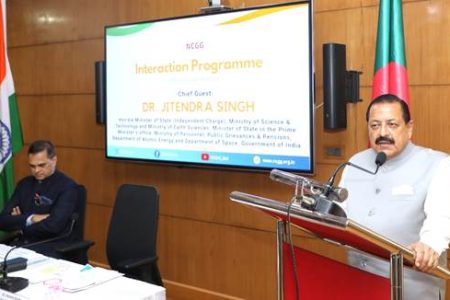New Delhi: Union Minister Dr. Jitendra Singh emphasized the importance of mutual exchange of best practices and knowledge to address common issues during an interaction with 16 Deputy Commissioners from Bangladesh. The officials are attending a ‘Special Capacity Building Programme on Public Policy & Governance’ organized by the National Centre of Good Governance (NCGG) at CSOI, New Delhi.
Dr. Jitendra Singh, who holds multiple portfolios including Union Minister of State (Independent Charge) for Science and Technology, Minister of State (Independent Charge) for Earth Sciences, and Minister of State in the PMO, Department of Atomic Energy, Department of Space, Personnel, Public Grievances, and Pensions, highlighted the replication of India’s developmental programs in Bangladesh. Initiatives such as PM Awas Yojana, Ayushman Bharat, CPGRAMS, and Swamitva have served as role models for similar programs in Bangladesh.
Addressing the gathering, Dr. Singh said, “India and Bangladesh share a profound historical bond, encompassing cultural, linguistic, and civilizational ties. It is heartening to see bright Senior Civil Servants of Bangladesh attending the Capacity Building program conducted by the NCGG.” He underscored the relationship of mutual trust, equality, and understanding between the two nations and noted Bengal’s historical contribution of outstanding civil servants even before India’s independence. He emphasized that both countries, being part of the same subcontinent, face similar challenges in terms of geography, resources, climate, and culture.
Dr. Singh discussed the significant reforms undertaken in the recent decade, which have ushered in citizen-centricity and good governance. He expressed satisfaction that India’s success stories in geo-spatial policy, land record management, mapping, and door-to-door service delivery are being admired by Bangladesh. Notably, PM Awas Yojana is being replicated as the Ashrayaan Project in Bangladesh, and PM Awards for Excellence in Public Administration are also being adopted. The Ayushman Bharat Scheme, a groundbreaking initiative providing cashless treatment and ensuring healthcare for all, was highlighted as the world’s first health insurance scheme covering pre-existing medical conditions with immediate effect post-insurance.
Dr. Singh recalled the massive infrastructure boom and mentioned the collaborative rail connectivity projects between India and Bangladesh. Both nations signed a new memorandum of understanding (MoU) extending transit facilities for the movement of Bangladeshi goods to Nepal and Bhutan through the Indian railway network.
To tackle similar challenges and increase collaboration, Dr. Singh suggested identifying twin districts—one from India and one from Bangladesh—that share identical problems such as diseases, governance issues, or topographical challenges. This would facilitate cooperation and exchange of best practices. He highlighted how the Direct Benefit Transfer (DBT) model and JAM trinity (Jan Dhan-Aadhaar-Mobile) have saved millions from starvation and reduced leakages and pilferages over time.
“Prime Minister Narendra Modi’s ‘Neighborhood First policy’ has strengthened Indo-Bangladesh ties through capacity building, joint cooperation on infrastructure development, and increased people-to-people connect,” Dr. Singh said. He emphasized aligning national visions with the broader goals of ‘Viksit Bharat 2047’ and ‘Smart Bangladesh Vision 2041.’
The Deputy Commissioners from various districts of Bangladesh expressed their gratitude to India for organizing the program and recalled India’s pivotal role in recognizing Bangladesh as a nation and establishing diplomatic relations.

